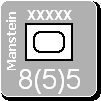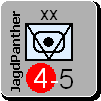Shannon V. OKeets
Posts: 22095
Joined: 5/19/2005
From: Honolulu, Hawaii
Status: offline

|
quote:
ORIGINAL: Zorachus99
It's great to see such an informal rule allowed. It's how play works in real life to a large degree.
However how do you deal with the limitations of the phasing player?
Example of real game:
Italy is running the Med Theatre and wants to use german air missions to fly air units to a sea area. Since the naval action comes before any land actions, Italy asks the German player if and how many air missions they can use from the German player. If the italian had four units on loan and flew all four out to sea areas, germany would have 0 air missions for their land impulse. Heck I've had the italians ask whether the German is doing a land because land moves could be limited.
Will the player with loaned units have full control of the lent units, or will they have to request permission before they use a unit that has limited activities, such as air, naval, or land units - all of which could have limits depending on the type of impulse which is declared...
When working with an italian player I often get questions on how many air missions they can have for the turn - not to mention them trying to talk me into using some sort of combined action. I envision some sort of dialogue alerting the phasing ally, whether or not a unit with a limited number of activities can be used, or better yet a request for activities that are limited (this wouldn't force the map to refocus). This both keeps your head out of a theatre you aren't paying attention to, and allows you to keep a tight grip on your activities which are so limited during a turn.
If the loaned unit is affecting activities allowed in a turn without alerting me, I would personally not have any units on loan - defeating the idea.
This falls into a category I have loosely labeled "to be worked out by the players". Having MWIF enforce agreements/arrangements between allies, seems to me to be outside the scope of the game design. Primarily that is because when people reach agreements (verbal or written) there are always a bunch of odds and ends that are 'understood' yet not formally agreed to. Enforcing the RAW rules make MWIF a whole lot like writing a law dissertation already. I've no taste for more of the same.
More to your point, you will see all the moves that a player on your side makes, as he makes them. The team leader is in charge of sending off all the moves to the other side, once they have been completed by everyone on his side. You will have the opportunity to intervene between the time that your ally moves a loaned unit and the team leader sends off the moves. To intervene is rather simple: as the original owner, you just reassert control of the loaned unit. At that point you can undo its move, should you so desire.
----------------
Dan Hatchen and I have been working out the specifics of recording moves on all the different computers participating in an Internet game - and keeping them synchronized. What we have come up with is that there will be Entry #s, Transaction #s, and Interside Communication #s (ICs). An entry number is associated with each atom of detail that changes the game position. So if you move a land unit several hexes, there will be a unique entry # for each hex it traverses. When it has stopped moving, the sequence of entry #s associated with its full move will be recorded as a transaction. Indeed, the associated transaction # is part of the game record log for each entry #.
Now, when a side has moved all its units and is ready to end a phase and pass control over to the other side, an IC# will be created and all the entry #s for the phase will be sent to the other side. Oh, I forgot to mention, each transaction will be sent to every player on the same side when it is completed. This works out to entrys not being sent to any other players until a transaction has been completed. Once a transaction is done, all the players on the same side will see it. The players on the other side won't see anything until all the moves for the phase have been completed. There are details of the non-phasing player's decision making I am intentionally glossing over here.
In practice, I expect each player to have two detailed map windows visible at all times: a big one on which he makes his own moves, and a smaller one on which any moves by his allies are displayed upon receipt.
One of my intentions with this design is to give players the opportunity to show their allies what they are doing. In combination with chat messages, you should be able to work out how to coordinate forces. I would like to provide more capabilities along this line but I am reluctant to do so because: (1) until we actually start playing games over the Internet there will be too much guesswork required as to what should be created and (2) I could see this becoming almost a whole new interface in and of itself (i.e., a ton of work).
_____________________________
Steve
Perfection is an elusive goal.
|
 Printable Version
Printable Version






















 New Messages
New Messages No New Messages
No New Messages Hot Topic w/ New Messages
Hot Topic w/ New Messages Hot Topic w/o New Messages
Hot Topic w/o New Messages Locked w/ New Messages
Locked w/ New Messages Locked w/o New Messages
Locked w/o New Messages Post New Thread
Post New Thread